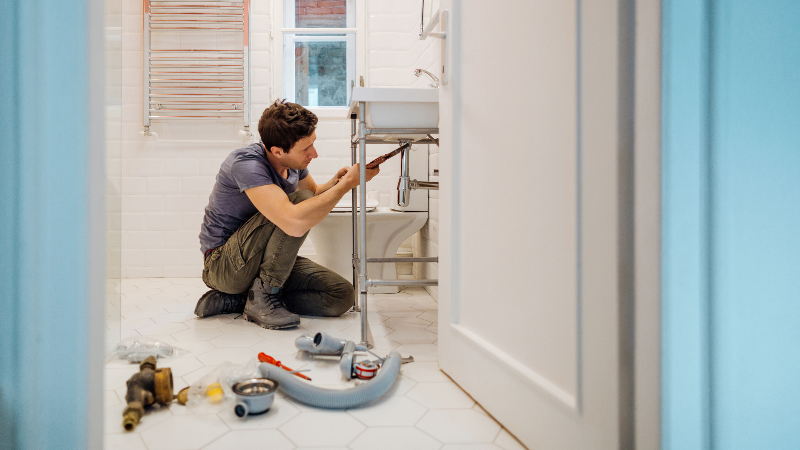AleksandarNakic/Getty Images
Our writers and editors used an in-house natural language generation platform to assist with portions of this article, allowing them to focus on adding information that is uniquely helpful. The article was reviewed, fact-checked and edited by our editorial staff prior to publication.
Key takeaways
- Homeowners insurance typically provides coverage for plumbing damage and leaks when they occur suddenly and unintentionally.
- Most standard homeowners insurance policies exclude coverage for plumbing issues resulting from inadequate maintenance or homeowner negligence.
- Some insurers offer optional endorsements that provide additional plumbing insurance coverage, such as water or sewer backup, sump pump backup and service line coverage.
- Regular maintenance of your plumbing system can help prevent emergency plumbing repairs and plumbing-related homeowners insurance claims.
Plumbing issues can be inconvenient and costly. If you’ve recently paid a high plumbing bill, you might wonder if your home insurance covers plumbing costs. There are many circumstances where a standard home policy will cover plumbing damage, but there are some situations where this damage is excluded from your policy. This guide walks you through what homeowners insurance covers when it comes to plumbing and whether it’s worth it to file a claim.
Does home insurance cover plumbing?
Whether your insurance policy will cover leaks or broken pipes depends on the circumstances. If a plumbing issue or leak occurs suddenly and by accident, homeowners insurance usually provides coverage. For instance, damage is likely covered if it results from a burst pipe that happened unexpectedly or from a frozen pipe even though you took every precaution to prevent it from happening.
Plumbing repairs and expenses often fall within the following coverage types:
- Dwelling coverage: Dwelling coverage will generally pay for any damage to the overall structure of your home. So if a pipe bursts and the resulting water damages your walls, floors and cabinetry, this coverage type would pay for repairs up to your policy limit.
- Other structures coverage: Separate from the main house, home insurance can also pay for damage to other structures on your property, like a detached garage or gazebo, if there is a covered plumbing incident.
- Personal property coverage: Any personal property that is damaged by sudden and accidental water losses will typically be replaced up to your policy’s limit with this type of coverage. For example, if a pipe bursts and damages your laptop, property coverage would usually pay for its replacement up to your policy limits.
- Additional living expenses coverage: If your home becomes uninhabitable due to a covered claim, additional living expenses coverage helps pay for incurred costs, such as hotel rooms, restaurant bills and pet boarding.
When does home insurance not cover plumbing?
Insurance exists to help pay for sudden damage, not for regular home maintenance. There are a few situations where home insurance does not cover plumbing claims, including:
- Long-term leaks: Insurance typically provides coverage for pipes that burst, but it doesn’t usually cover leaky pipes — especially if the damage occurred over an extended period. If the pipe has been leaking for a while, your insurance provider will likely deny your claim, defaulting to you to take care of general maintenance issues.
- Negligence: If you made no attempt to keep your home heated during the winter months and pipes froze or burst as a result, you would probably be expected to pay for repairs out of pocket.
- Old plumbing: If your plumbing system is old and needs to be replaced (say, it shows signs of aging, rust, wear or corrosion), your home insurance company is unlikely to pay to have it replaced or repaired.
- Sump pump failure: Sump pump damage is covered by an optional add-on, called sump pump or water backup coverage, and is not covered by a standard homeowners policy.
- Storm surges and floods: Water damage from storm surge flooding, including heavy rain and melting snow, is excluded from most standard home insurance policies. For coverage, you would need to purchase a separate flood insurance policy.
Learn more: How to dispute home insurance claim denials and settlements
What additional coverage options are available for plumbing issues?
You may be able to add endorsements to your home insurance policy for additional plumbing-related perils. These coverage types include:
- Water or sewer backup: This coverage provides financial protection if a sewer line backs up into your home or onto your property.
- Sump pump backup: If your home has a sump pump that drains standing water or sewage out of your house, the pump could fail and cause flooding. A standard home insurance policy typically does not cover such incidents.
- Service line coverage: This is another optional add-on that covers the replacement of utility lines on your property that are outside of your home. These usually include water, steam, sewer and drain pipes.
How to avoid leaking pipes and other plumbing damage
Preventing plumbing damage and leaks in your home involves a proactive approach. Here are some steps you can take:
Install a leak detection device
Consider installing a flow-based leak detection system that automatically shuts off the water supply when a leak is detected. Some devices may even send alerts to your phone to notify you of a potential issue.
Maintain your HVAC systems
Ensure your HVAC systems are functioning optimally by keeping the drip pans clean and the drain lines free from any obstructions and flowing correctly. If there are any filters, they should be replaced at regular intervals.
Inspect and replace appliances regularly
Regularly check your washing machine, dishwasher, ice maker and garbage disposal for leaks. When it comes to appliances, prevention is often the easiest way to mitigate costly repairs. It may be helpful to set a calendar reminder to replace hoses and other connection lines regularly.
Keep gutters and downspouts clean
Regularly clean out gutters to prevent blockage, and clean your downspouts to allow water to move through. Home experts recommend cleaning your gutters at least once every six months.
Monitor your home’s water pressure
Use a water pressure gauge to measure your home’s water pressure. Generally speaking, anything from 40 to 80 psi is considered normal. If you’re unsure about your water pressure, it may be helpful to consult an expert.
Familiarize yourself with the location of your water main and how to shut it off, especially if you plan to vacate your home for a period of time.
Replace old plumbing
If your home’s plumbing is visibly old and showing signs of wear and tear, you might consider replacing it before there are any issues. If you’re on the fence about whether to overhaul your entire plumbing system, you can make an appointment with a home inspector, who can provide a professional recommendation about what to do.
Monitor tree growth
If you have any trees that are close to your home, keep a close eye on growth rate to avoid letting root systems damage your plumbing. Doing research on tree variety can also help you identify whether the species is prone to extensive root growth.
Insulate your plumbing and prep for winter
Pipe insulation can prevent both cold and hot pipes from freezing in the winter. Typically, insulators are fairly easy to install yourself, or you can contact a professional for help. If you live somewhere temperatures regularly drop to below freezing, you can prepare your home for winter with the following steps:
- Keep your thermostat at or above 60 degrees, even when you’re not home.
- Blow out your sprinkler systems.
- Turn off the water supply to outdoor spigots and leave drain valves open.
If you plan to be away for an extended period during the winter, it’s a good idea to have a trusted friend or neighbor come check your home every once in a while for plumbing problems. Experts also recommend leaving cabinets and interior doors open in your home to allow heat to reach all the rooms and walls — especially if you live in a cold climate.
Frequently asked questions
-
-
There are a few different ways you may be able to prove plumbing damage to your homeowners insurance company. Sharing photo or video evidence is often one of the simplest. In addition to documenting the broken pipe or problematic plumbing (if it’s accessible), it’s usually a good idea to share documentation of all property damage stemming from the incident.
-
If your appliances are damaged or destroyed in a plumbing peril that is covered by your home insurance policy, such as a burst pipe, they will likely be covered as part of your claim. If you are concerned about replacement costs for any of your appliances, you may want to evaluate your personal property coverage with your insurance agent to ensure you have enough coverage. Another option for additional appliance coverage is equipment breakdown insurance. This endorsement pays for appliance repairs or replacement following a mechanical breakdown.
-
Most standard plumbing insurance covers burst pipes and the resulting damage, but be aware of coverage limits on your policy. You might benefit from speaking with your home insurance agent about the terms of your coverage. In addition, proactively insulating your pipes and dripping your faucets during cold snaps can help prevent pipes from freezing.
-
Flood insurance typically provides coverage for various types of flooding incidents that may impact your property, including the intrusion of floodwater or mud, damage caused by surface runoff water, flash floods and storm surges. Flood insurance usually excludes damage from plumbing, but the other coverage types included in your homeowners insurance policy generally cover the costs of repairs or replacements resulting from sudden and unforeseen plumbing issues.
-
Read the full article here
















